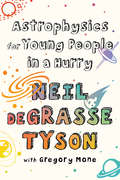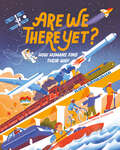Title search results
Showing 1 - 5 of 5 items

Astrophysics for young people in a hurry
By Gregory Mone, Neil DeGrasse Tyson. 2019
DAISY audio (Direct to player), DAISY audio (Zip)
Science and technology, Physics
Human-narrated audio
Neil deGrasse Tyson introduces young listeners to astrophysics and the principles of scientific inquiry, fostering the "cosmic perspective" that outer space inspires in all. Grades 4-7. 2019.

Are We There Yet?: How Humans Find Their Way (Orca Timeline #4)
By Maria Birmingham, Drew Shannon. 2023
DAISY audio (Direct to player), DAISY audio (Zip)
Adventure and exploration, Social issues, Politics and government, General non-fiction, Travel and geography
Human-narrated audio
Part of the nonfiction Orca Timeline series for middle-grade readers, this illustrated book examines how humans have navigated the world over time.

Astrophysics for Young People in a Hurry
By Neil DeGrasse Tyson. 2019
Braille (Contracted), Electronic braille (Contracted), DAISY Audio (Direct to Player), DAISY Audio (Zip), DAISY text (Direct to player), DAISY text (Zip), Word (Zip), ePub (Zip)
Science and technology, Physics
Synthetic audio, Automated braille
Neil deGrasse Tyson’s #1 New York Times best-selling guide to the cosmos, adapted for young readers. From the basics of…
physics to big questions about the nature of space and time, celebrated astrophysicist and science communicator Neil deGrasse Tyson breaks down the mysteries of the cosmos into bite-sized pieces. Astrophysics for Young People in a Hurry describes the fundamental rules and unknowns of our universe clearly—and with Tyson’s characteristic wit, there’s a lot of fun thrown in, too. This adaptation by Gregory Mone includes full-color photos, infographics, and extra explanations to make even the trickiest concepts accessible. Building on the wonder inspired by outer space, Astrophysics for Young People in a Hurry introduces an exciting field and the principles of scientific inquiry to young readers.
Calling All Minds: How To Think and Create Like an Inventor
By Temple Grandin. 2018
Braille (Contracted), Electronic braille (Contracted), DAISY Audio (Direct to Player), DAISY Audio (Zip), DAISY text (Direct to player), DAISY text (Zip), Word (Zip), ePub (Zip)
Physics, Science and technology
Synthetic audio, Automated braille
From world-renowned autism spokesperson, scientist, and inventor Temple Grandin -- a book of personal stories, inventions, and facts that will…
blow young inventors' minds and make them soar.Have you ever wondered what makes a kite fly or a boat float? Have you ever thought about why snowflakes are symmetrical, or why golf balls have dimples? Have you ever tried to make a kaleidoscope or build a pair of stilts? In Calling All Minds, Temple Grandin explores the ideas behind all of those questions and more. She delves into the science behind inventions, the steps various people took to create and improve upon ideas as they evolved, and the ways in which young inventors can continue to think about and understand what it means to tinker, to fiddle, and to innovate. And laced throughout it all, Temple gives us glimpses into her own childhood tinkering, building, and inventing. More than a blueprint for how to build things, in Calling All Minds Temple Grandin creates a blueprint for different ways to look at the world. And more than a call to action, she gives a call to imagination, and shows readers that there is truly no single way to approach any given problem--but that an open and inquisitive mind is always key. A New York Times Bestseller
Are We There Yet?: How Humans Find Their Way (Orca Timeline #4)
By Maria Birmingham. 2023
Braille (Contracted), Electronic braille (Contracted), DAISY Audio (Direct to Player), DAISY Audio (Zip), DAISY text (Direct to player), DAISY text (Zip), Word (Zip), ePub (Zip)
Adventure and exploration, Travel and geography, General non-fiction
Synthetic audio, Automated braille
Why do some people have a bad sense of direction? How can you avoid getting lost? Why did early mapmakers…
put fake towns on their maps and why does every traffic controller in the world speak English? From finding food, water and shelter to traveling for commerce, trade and eventually exploring the world, humans have always had to find their way from one place to another. Are We There Yet? examines the evolution of how we navigate the world. Our earliest ancestors relied on built-in navigation systems in our brains and followed clues like star patterns and animal behavior. Then came the invention of maps, faster transportation and eventually technology, like satellites and GPS. And from the depths of the ocean to faraway planets, there's still plenty of exploring to do. Where will we go next? The epub edition of this title is fully accessible.